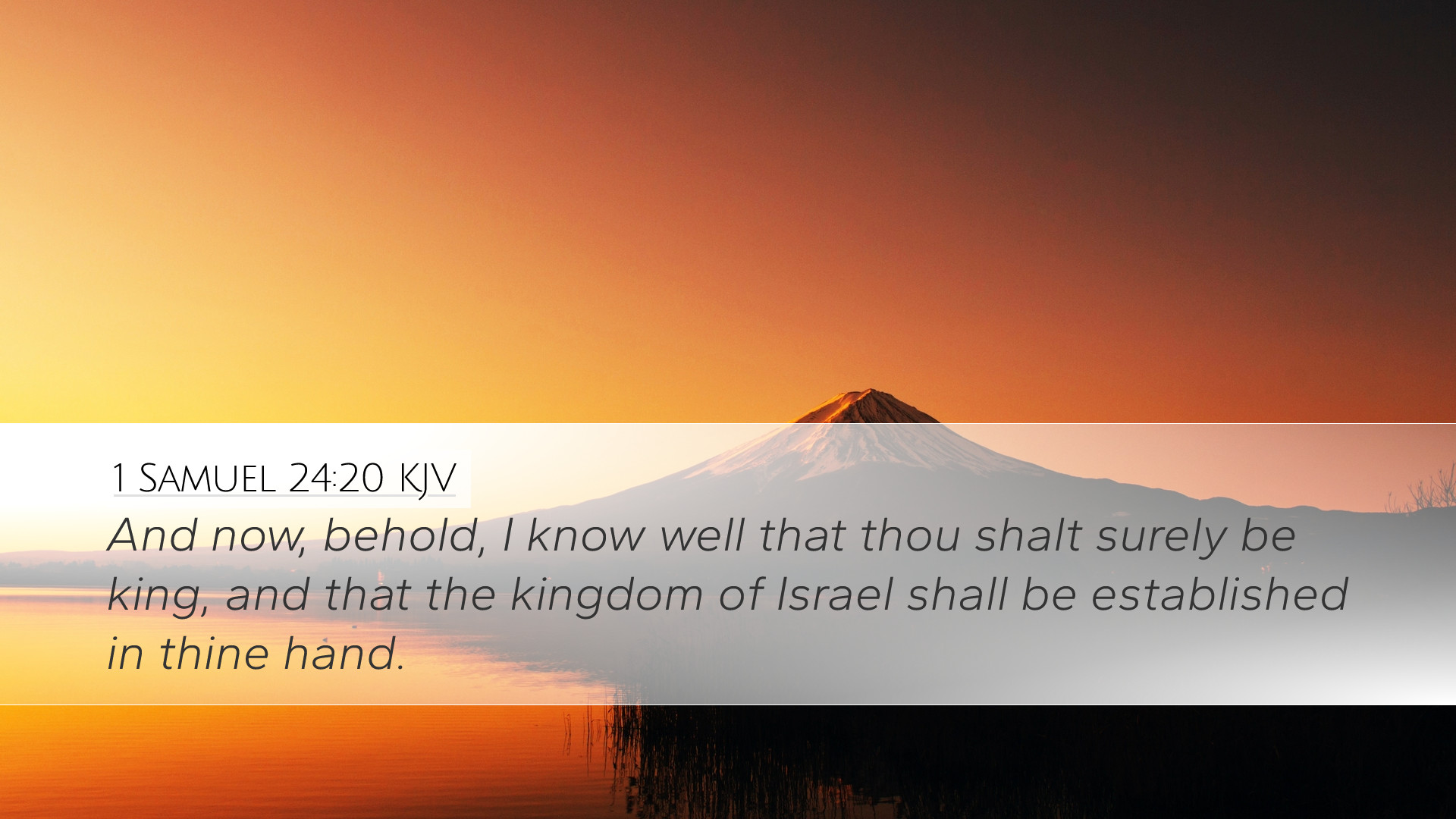Commentary on 1 Samuel 24:20
Verse: "And now, behold, I know well that thou shalt be king, and that the kingdom of Israel shall be established in thine hand."
Introduction
1 Samuel 24:20 presents a pivotal moment in the narrative surrounding David and Saul, illustrating themes of divine providence, acknowledgment of God's will, and the complexity of human relationships in the context of leadership and authority. This verse stands as a testimony of recognition of David's future kingship, offered by his adversary, King Saul.
Contextual Overview
This verse is located in the account of David's encounter with Saul in the cave of En-gedi. At this juncture, David has spared Saul's life, demonstrating mercy and restraint despite being pursued unjustly. The context is crucial as it reveals the dynamics of their relationship and highlights the tension between God's anointed and his chosen successor.
Historical Background
The historical timeline leading to this moment is filled with conflict and tension. Saul, the first king of Israel, had been rejected by God for his disobedience. David, who had been anointed by the prophet Samuel, represents God's chosen replacement. This sets the stage for a dramatic confrontation where David’s integrity shines against Saul’s failure.
Theological Insights
Divine Recognition
Saul's statement acknowledges the sovereign plan of God for Israel. In this acknowledgment, several theological themes can be drawn:
- God's Sovereignty: The recognition of David’s future kingship emphasizes that God is in control of history and that His plans cannot be thwarted by human actions.
- The Nature of Divine Election: Saul’s acceptance of David as king illustrates that God's choices often defy human understanding and preference, casting light on the nature of His grace.
- Human Agency and Responsibility: While God’s sovereignty prevails, the human response to His call is also crucial. David’s mercy reflects a character aligned with God's heart.
Interpersonal Dynamics
The highly charged emotions between David and Saul bring to light important lessons about leadership and humility:
- Mercy in Leadership: David's choice to spare Saul is a profound moral lesson. It indicates that true leaders often demonstrate mercy, even toward their enemies.
- Acknowledgment of Others' Callings: Saul’s admission can serve as an example for leaders to recognize and affirm the gifts and callings of others rather than competing against them.
Commentary from Matthew Henry
According to Matthew Henry, Saul’s words reveal a grudging acknowledgment from a rival, highlighting the tension between the ruling authority and the divinely destined successor. Henry emphasizes the significance of humility in David who, despite being the anointed king, refrains from taking the throne by force.
Furthermore, Henry points to this moment as indicative of God's plan; it illustrates how God’s providence often operates through the actions of those who are unwittingly fulfilling divine purposes. Saul’s recognition serves as a sobering reminder that God can use anyone to convey His truth, even one who is actively opposing His will.
Commentary from Albert Barnes
Albert Barnes focuses on the prophetic nature of Saul’s statement. He suggests that Saul’s acknowledgment is not merely an offhand remark but rather a prophetic insight given by God. This moment serves to reinforce the authenticity of David’s future rule as orchestrated by divine foresight.
Barnes further explores the psychological aspect of Saul’s recognition, noting that his envy and fear of David do not diminish his awareness of God’s plan. This highlights the internal conflict faced by Saul as he grapples with his deteriorating kingship while confronting the legitimacy of David’s future reign.
Commentary from Adam Clarke
Adam Clarke adds depth to the understanding of this verse by analyzing the nature of acknowledgment in the face of rivalry. He points out that Saul’s declaration not only showcases his awareness of the truth but also reveals the complexity of his emotional state—he is torn between his role as king and his recognition of David’s legitimacy.
Clarke notes that Saul’s public admission of David’s kingship is a crucial moment of vulnerability, revealing the human condition when faced with inevitable change and divine will. This acknowledgment opens avenues for conversation about humility and honesty in leadership, as well as the importance of recognizing God’s choices even when they contradict our own plans.
Practical Applications
The account of 1 Samuel 24:20 provides rich material for pastoral application:
- Leading with Integrity: Leaders are called to act with integrity, showing mercy to opponents and recognizing those whom God has appointed, even when it challenges personal ambitions.
- Understanding God’s Plan: In moments of conflict, believers are encouraged to trust in God’s overarching plan, understanding that His ways may include unexpected twists and turns.
- Encouraging Recognition of Gifts: Encouraging humility in leadership can foster an environment where gifts and callings are affirmed, promoting unity within the body of Christ.
- Reflecting Christ's Forgiveness: The mercy shown by David serves as a precursor to the greater forgiveness demonstrated by Christ, inspiring believers to embody grace in their interactions.
Conclusion
1 Samuel 24:20 encapsulates a critical intersection of divine election, human recognition, and the moral complexity of leadership. The insights drawn from public domain commentaries enrich our understanding of the text, enabling pastors, students, and theologians to glean wisdom applicable to contemporary leadership challenges. As we reflect upon this verse, may we strive to embody the principles of mercy, humility, and recognition of God’s sovereign will in our lives and ministries.


